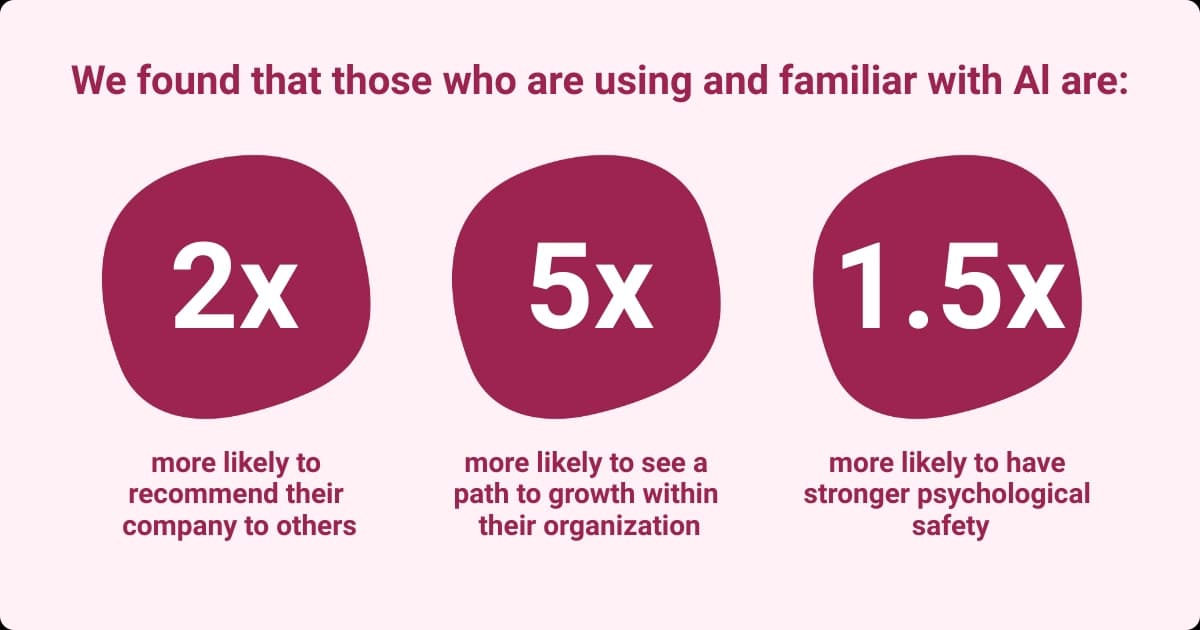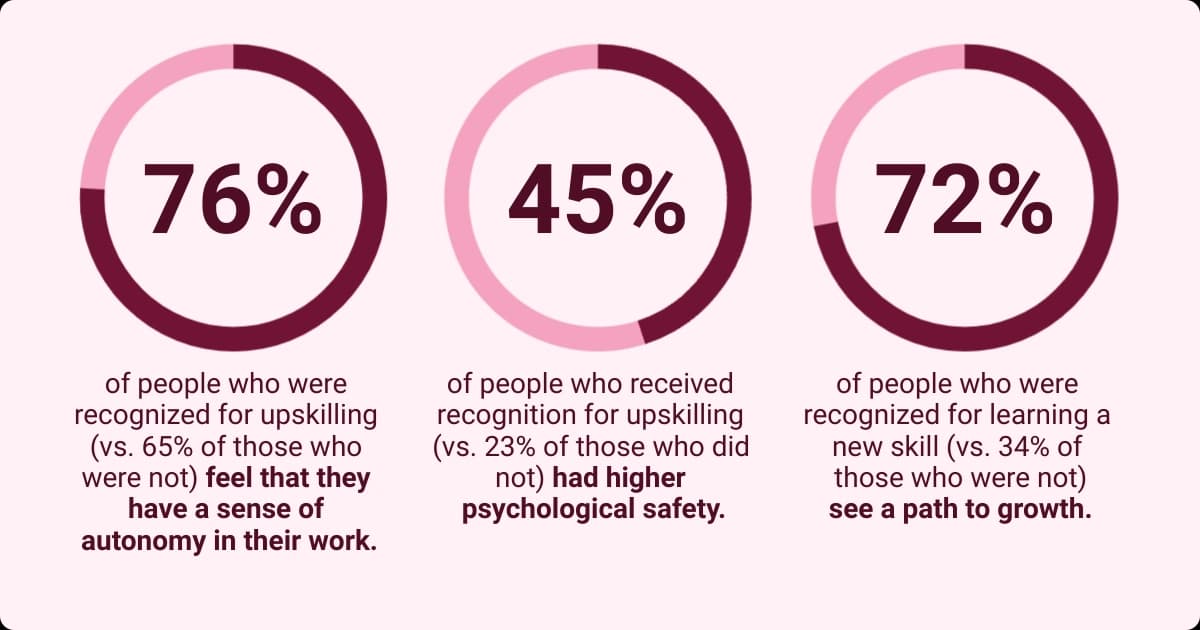AI in HR: The Training Gap (and How to Close It)

Human resources has, historically, been a very manual arm of the workforce. Headcount and talent management, job descriptions, onboarding – all of these processes are poised to be overhauled in the advent of artificial intelligence (AI).
AI has already taken the world of HR by storm and shows no signs of stopping. According to Gartner, 76% of HR leaders believe that if their organization does not adopt and implement AI solutions in the next 12 to 24 months, they will be lagging in organizational success compared to those that do.
AI has the potential to automate HR’s most manual processes and transform the industry to be more efficient and data-driven than ever. But none of that can happen if the elephant in the room isn’t addressed: the gap in AI training.
The latest Workhuman data reveals a significant gap in AI knowledge. Organizations know they need to be using AI, but their employees aren’t equipped to harness its full power due to a lack of training. Let’s dig into why this gap exists – and what organizations can do to close it.
The state of AI in HR today
Familiarity with AI matters in 2025 because workers know how deeply relevant it is. They know they need to be fluent in the latest tools and trends to continue excelling in their roles and to pursue innovation. But without organizational support for AI training, individual contributors (those who aren’t leaders, managers, or project managers) get left behind.
According to the latest Workhuman survey, senior leaders, managers, and project managers are more likely than individual contributors to agree that their organization has started to use AI for day-to-day work. They’re also more likely than individual contributors to be frequently using AI or agree that it’s built into their everyday tools.
63% of employees are unfamiliar with AI in the workplace. Discover how to upskill your workforce with the AI skills needed to thrive in the future.
The proof is in the numbers: employees want AI tools and training.

That said, 63% of respondents are not at all or only somewhat familiar with the use of AI in the workplace. Workhuman and Gallup research corroborates what the Workhuman iQ data shows: Among employees whose organizations have begun to implement AI, only 6% are very comfortable using AI in their role, while 32% are very uncomfortable using AI in their role.
The gap is clear: organizations across industries, in HR and beyond, agree that AI is going to play an ever-increasing role in the years to come, but no one is exactly sure how – or how their people will adapt to these changes.
The gap in AI proficiency
The AI knowledge gap doesn’t just exist between philosophy and implementation. It also exists between senior leaders and individual contributors.
The core issue? A lack of training.
Workhuman and Gallup found that, among organizations that have begun to implement AI technology, just 23% of employees report they are offered optional training, and only 15% are provided with required training.
With an estimatedOpens in a new tab 40% of the workforce needing to be reskilled due to the mainstream arrival of AI, this is an alarming gap.
The latest Workhuman iQ survey reveals that senior leaders (44%) are more than twice as likely as managers (20%), project managers (21%) and all other individual contributors (16%) to strongly agree that they see a path to grow within their organization.
Senior leaders are also the most likely to have received AI training.
The connection is clear: When organizations do not create or promote opportunities for their workforce to develop, they sabotage their own growth and agility.
Leaders and managers who are in tune with the demands of the modern workplace should meet their employees’ enthusiasm for upskilling and build a culture of skills-based learning where upskilling is not just encouraged but engrained in the fabric of how work is done.
Organizations will maximize the potential of AI and other new technologies, including the use of AI in project management, only when their employees are motivated to learn, explore, and make a conscious effort to integrate them into their roles.
Discover how strategic recognition and proactive upskilling promotion can facilitate the effective adoption of new technologies.
This is where the value of recognition comes into play. By recognizing employees for their upskilling efforts, organizations reinforce their investment and priority in both AI and upskilling. This signals to employees that their efforts are seen and valued.
This is an area in which leaders need to play an active role in order to make it happen. When individual contributors did learn a new skill, just 39% of those surveyed in the Workhuman iQ report received recognition compared to 52% of managers, 55% of project managers, and 59% of senior leaders.

But there’s no time to waste. Organizations need to prioritize reskilling and upskilling ASAP in order to keep up. Our data shows nearly half of respondents have been without any recent training opportunities, and 41% of individual contributors haven't learned a new skill in the last one to two years.
The power of Human Intelligence
Now that HR’s task is established – to prioritize AI upskilling while simultaneously promoting a culture of recognition to reinforce said upskilling – how can you accomplish all of this in 2025?
Enter: Human Intelligence™ by Workhuman.
In 2024, Workhuman debuted the new Workhuman® iQ and AI Assistant: AI tools that mine recognition data (what we at Workhuman call "human data") for transformative company insights. The output of these AI tools trained on data from Social Recognition® is Human Intelligence.
The insights surfaced by Human Intelligence can, for example, identify skills gaps where employees need more training. The Skills dashboard within Workhuman iQ shows potential skills gaps among teams while the platform sends Smart Nudges to people managers to ensure recognition is sent out at regular intervals. With these insights in hand, HR professionals and people managers can upskill their teams and recognize efforts toward upskilling, promoting a culture of innovation, growth, and gratitude.
It’s all the data HR teams have ever needed surfaced by AI within mere seconds. Human Intelligence offers expert insights derived from 100M+ data points across the Workhuman platform, combined with our 25+ years of experience driving employee engagement, productivity, and retention for a deep, broad customer base of the most iconic, global companies.
Final thoughts
AI isn't the wave of the future - it's here now.
With the data pointing to the seismic shifts AI will make to the workplace, the time to upskill the workforce is today. Unleash the power of Human Intelligence from Workhuman and level up your people, your culture, and your business.
About the author
Maeve Ginsberg
A wellness enthusiast and the mid-day walk’s #1 fan, Maeve champions work-life balance.
Having gone from a corporate job to self employment, Maeve has lived through countless working styles. This evolution forced confrontation of her own limiting beliefs, eventually breeding a completely individualized approach to work and productivity.
As a Senior Copywriter, Maeve often writes on workplace wellbeing and strives to advocate for all workers and leaders to find small yet significant ways to make their work lives healthier and more fulfilling.
Offline, Maeve enjoys testing new cuisines and hanging upside down off walls (also known as bouldering).